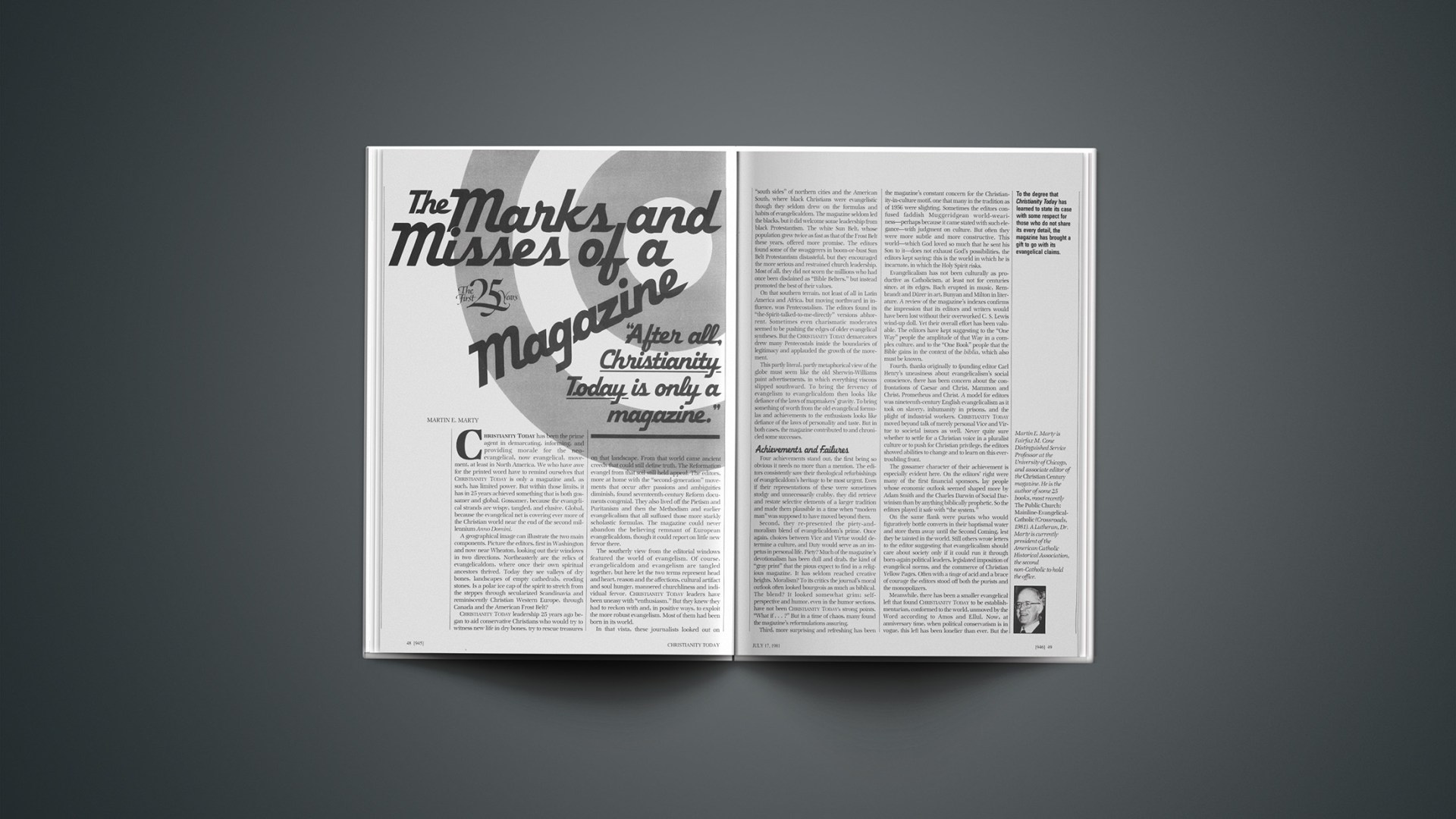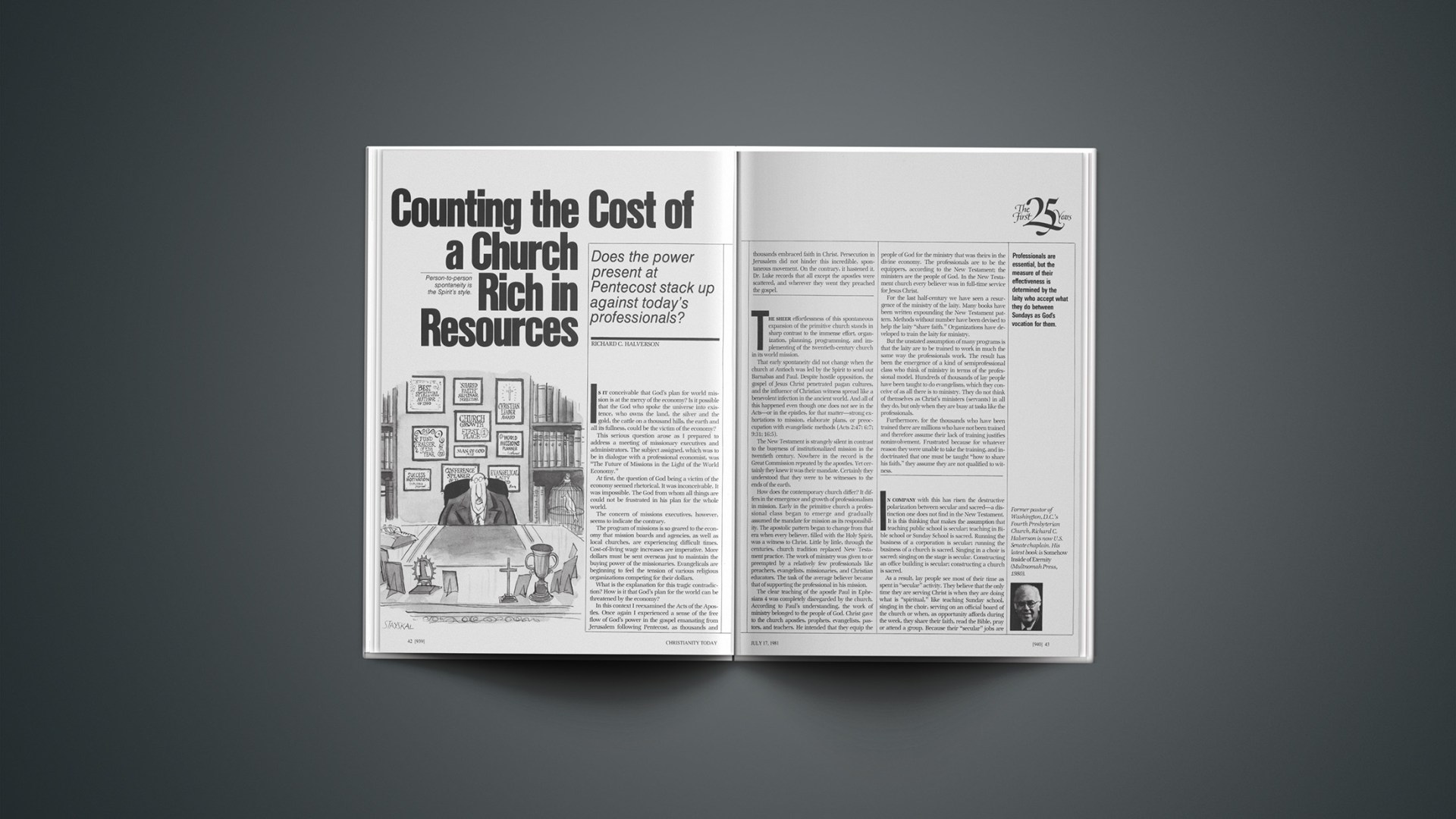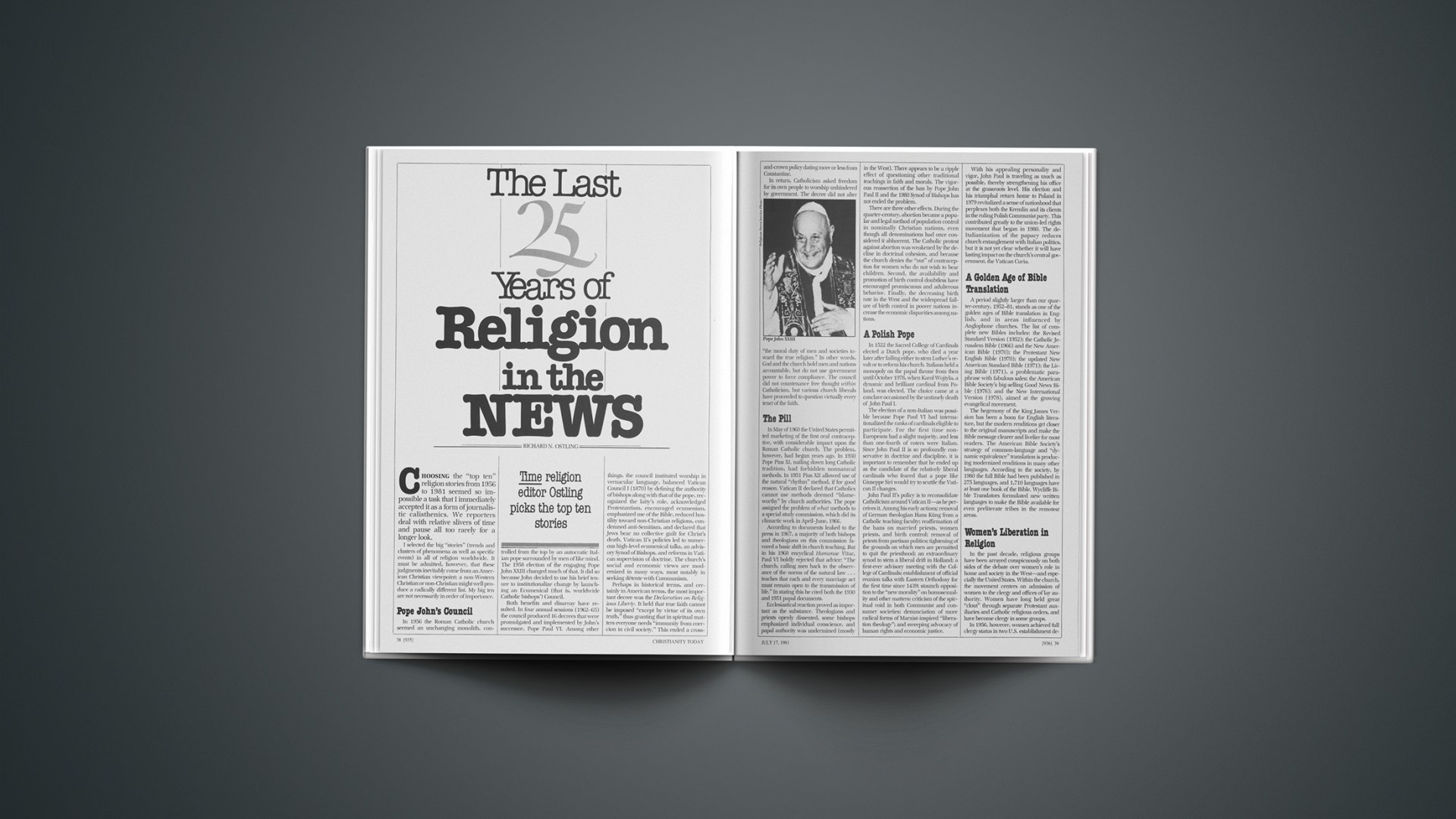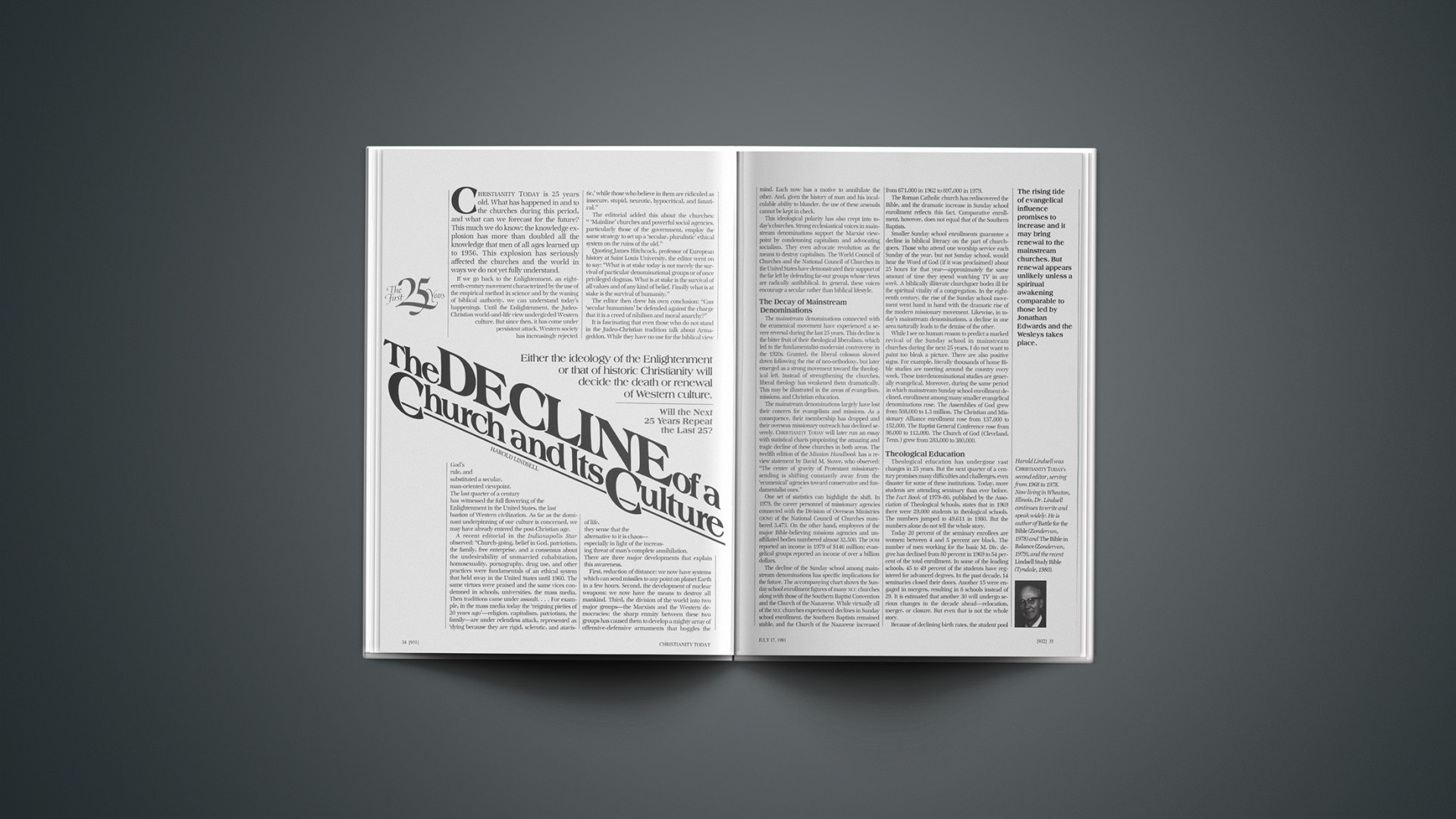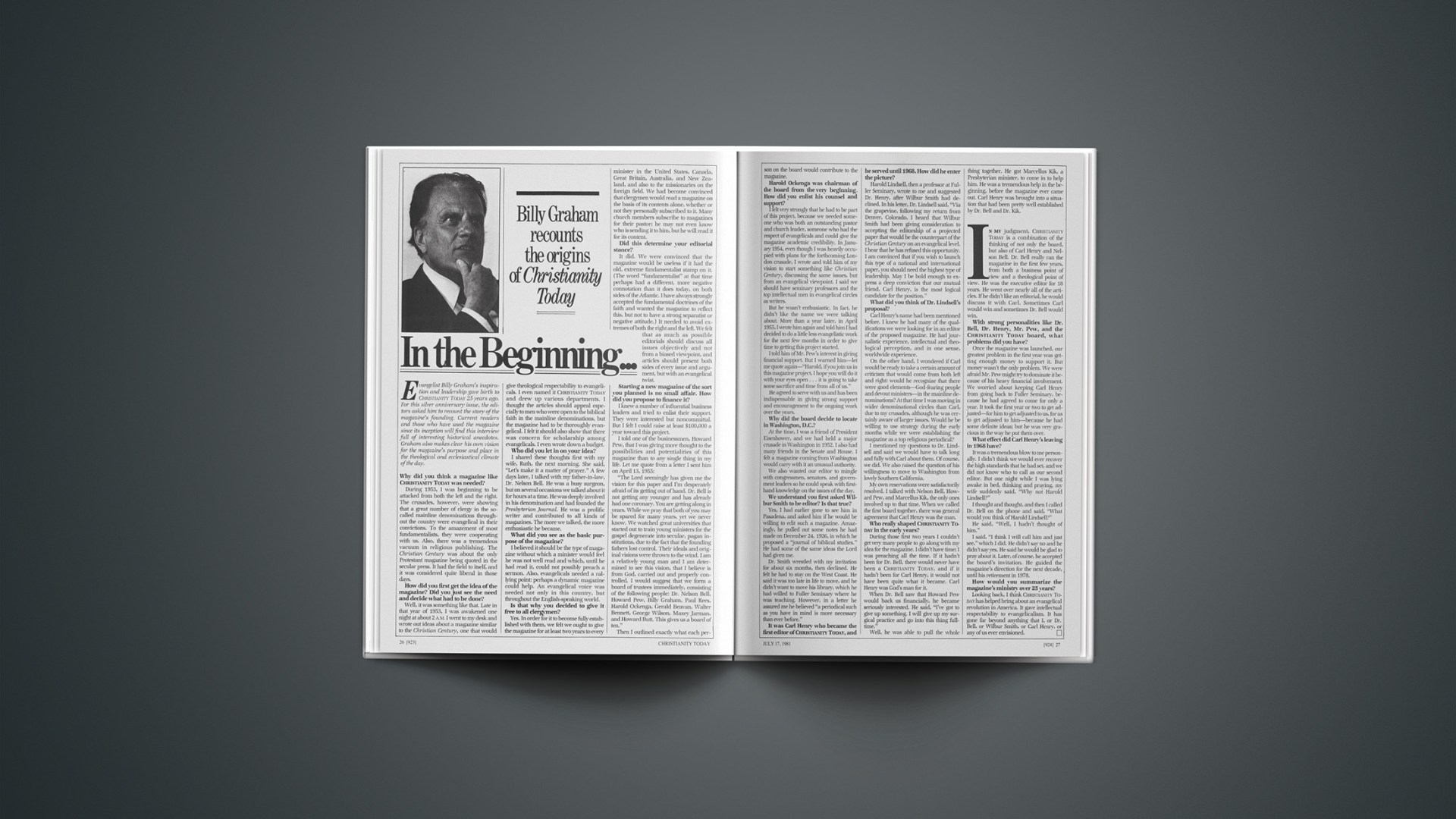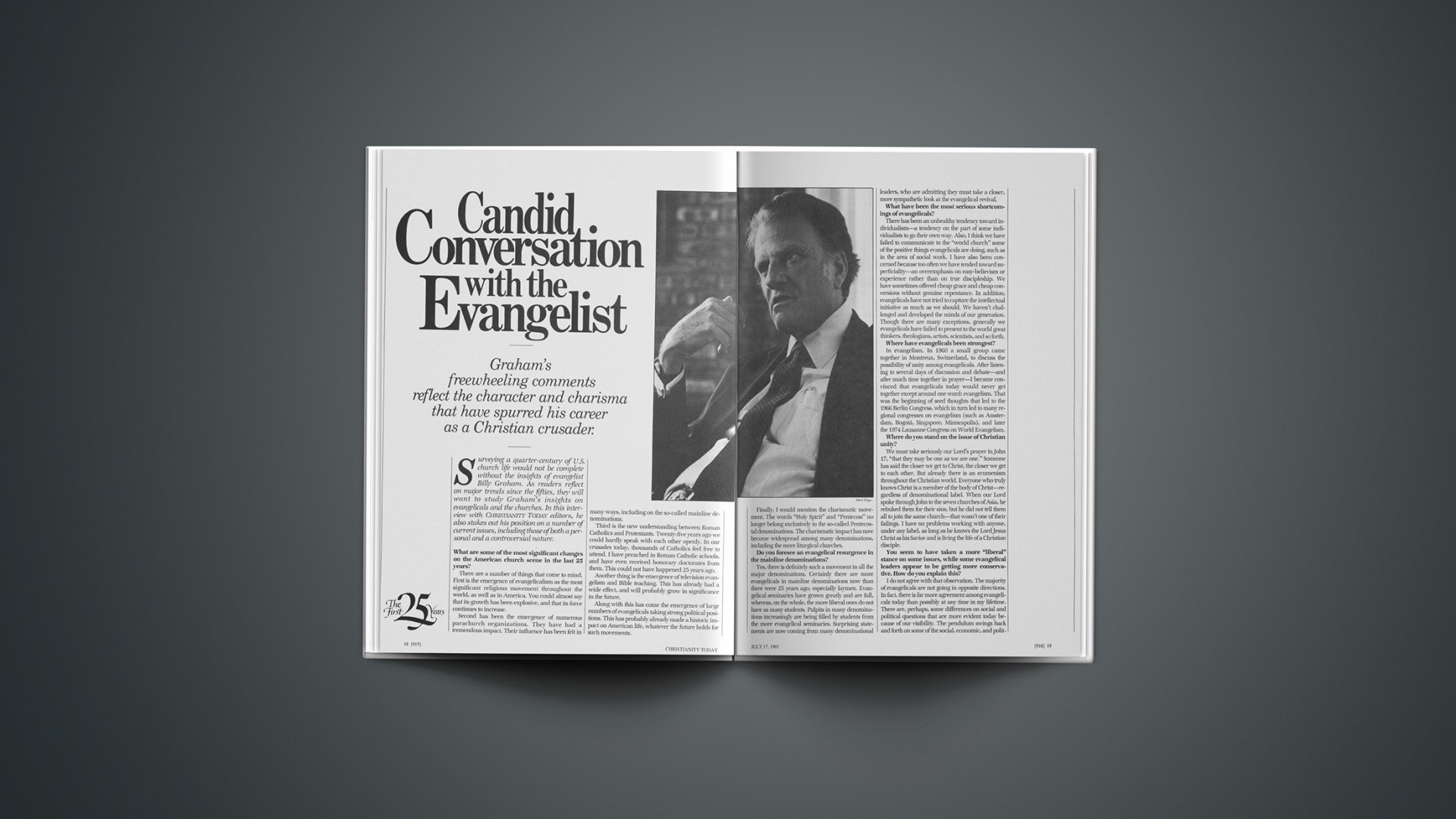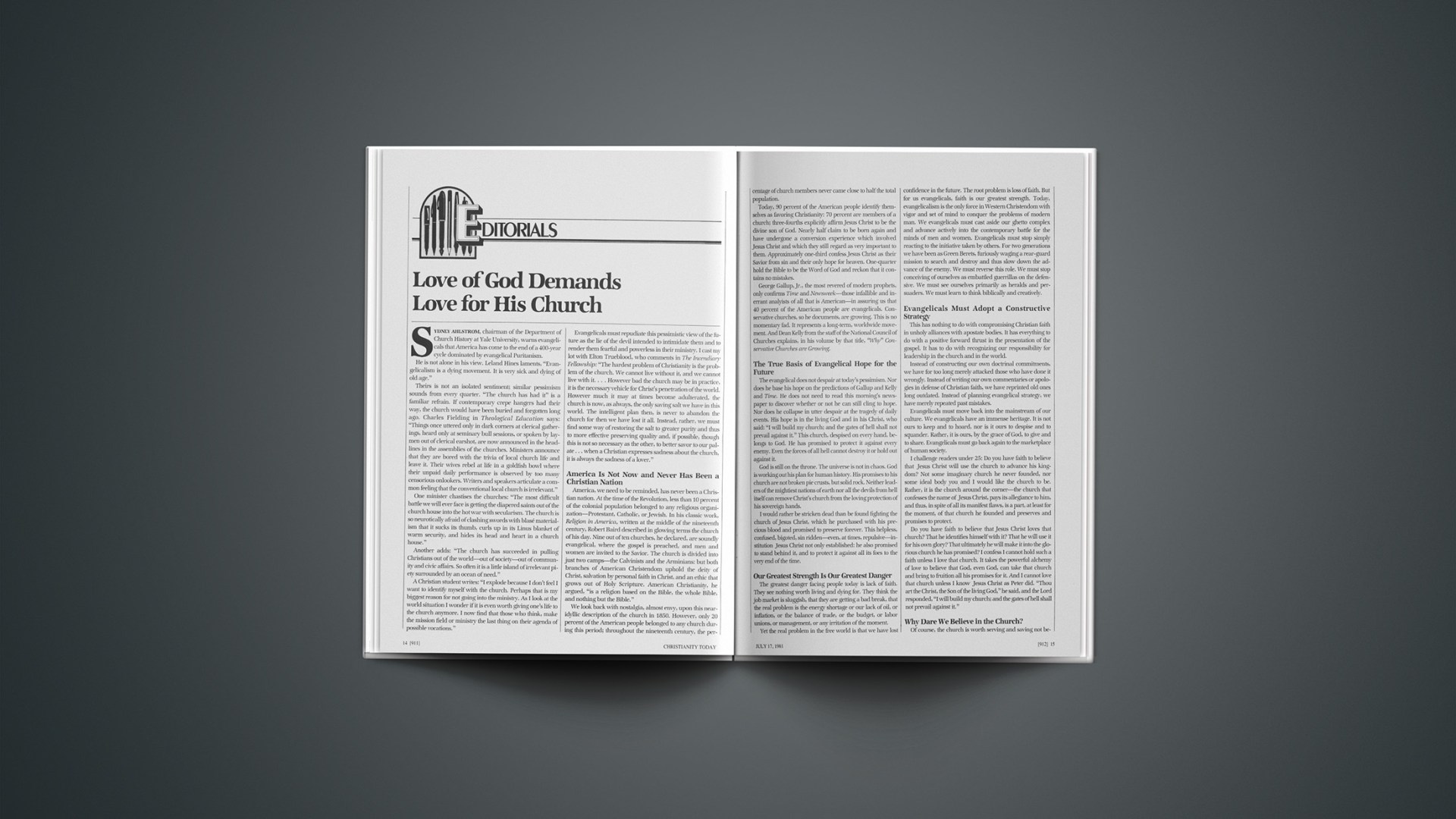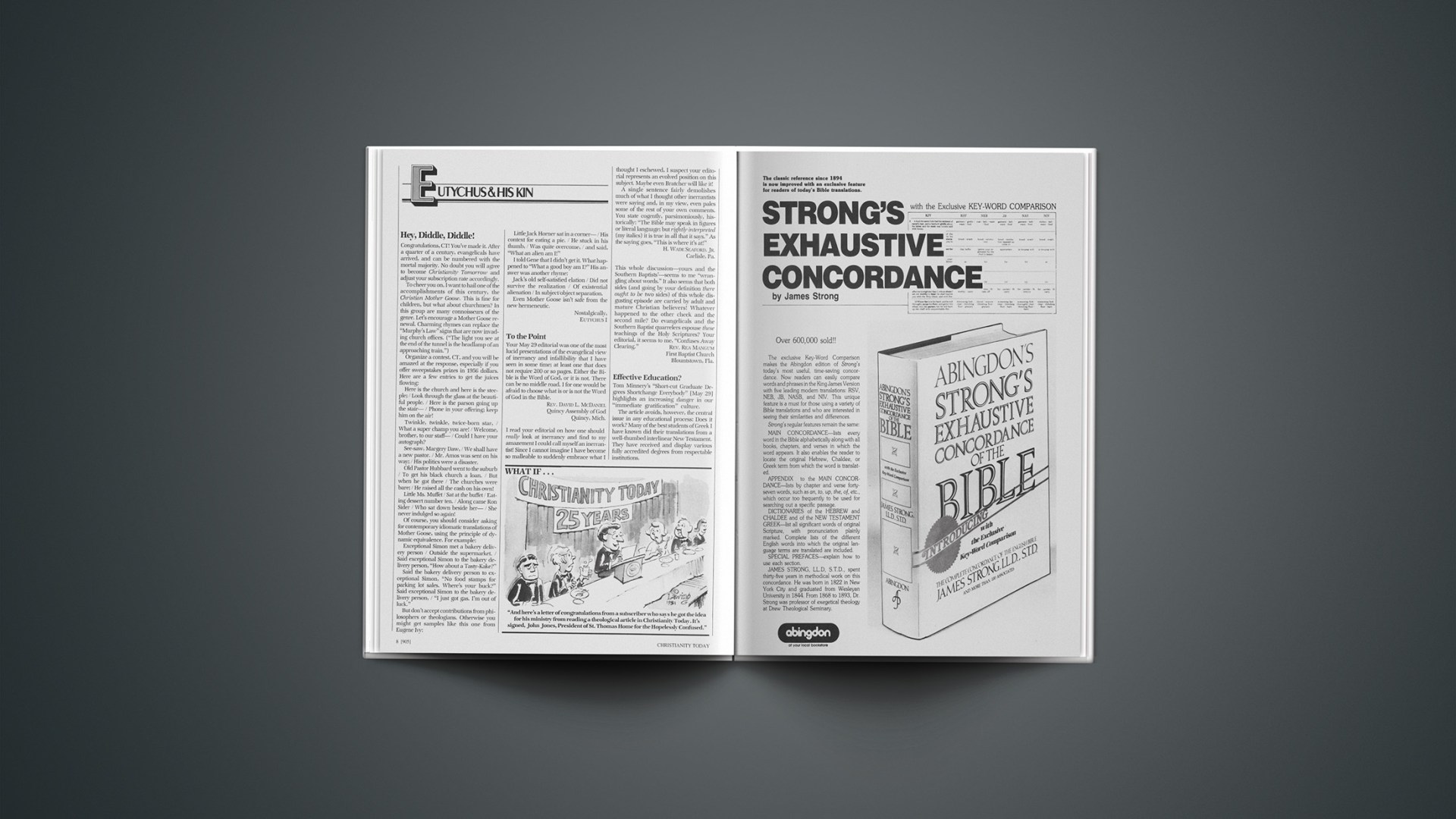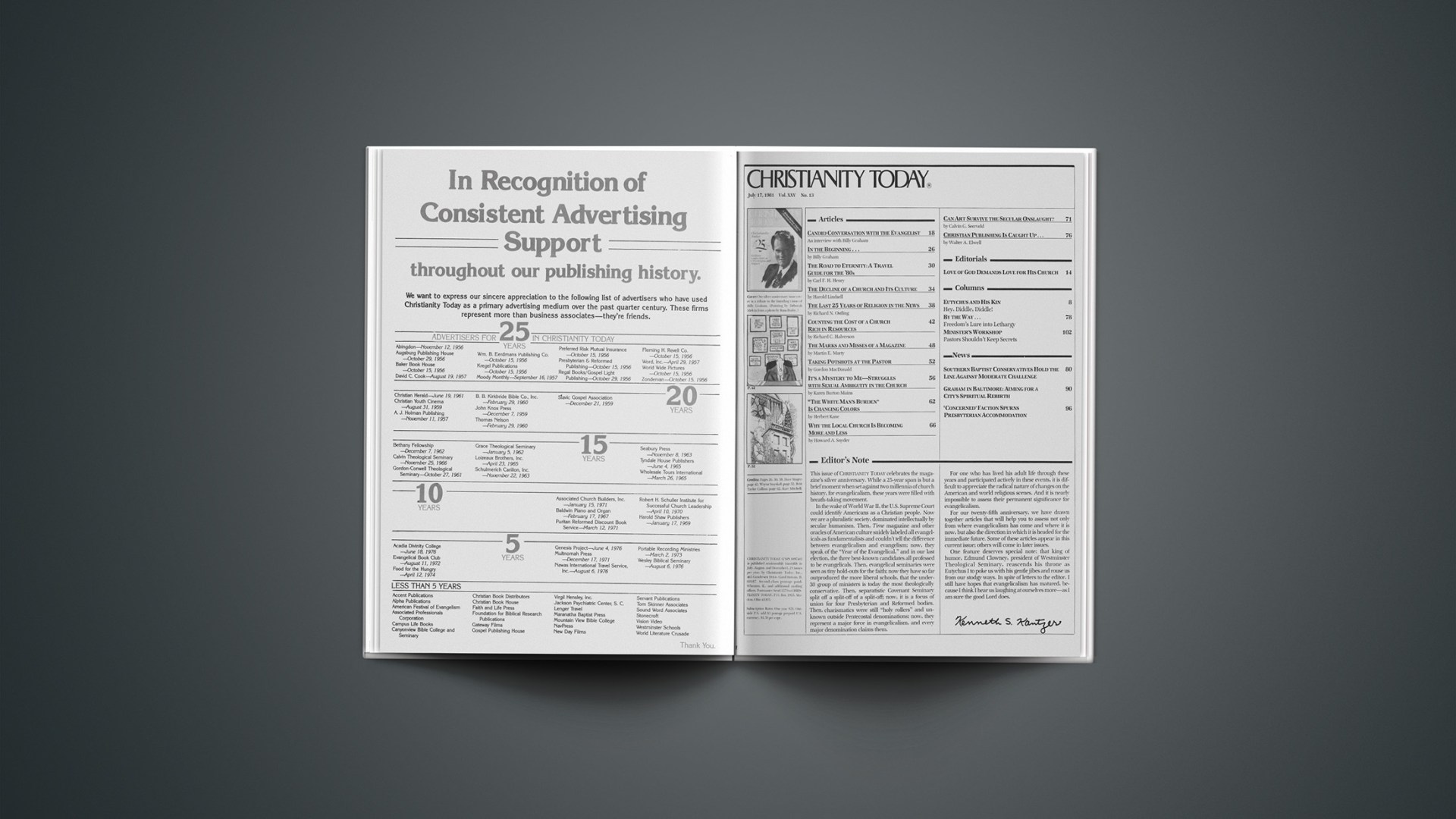Christianity Today has been the prime agent in demarcating, informing, and providing morale for the neo-evangelical, now evangelical, movement, at least in North America. We who have awe for the printed word have to remind ourselves that CHRISTIANITY TODAY is only a magazine and, as such, has limited power. But within those limits, it has in 25 years achieved something that is both gossamer and global. Gossamer, because the evangelical strands are wispy, tangled, and elusive. Global, because the evangelical net is covering ever more of the Christian world near the end of the second millennium Anno Domini.
A geographical image can illustrate the two main components. Picture the editors, first in Washington and now near Wheaton, looking out their windows in two directions. Northeasterly are the relics of evangelicaldom, where once their own spiritual ancestors thrived. Today they see valleys of dry bones, landscapes of empty cathedrals, eroding stones. Is a polar ice cap of the spirit to stretch from the steppes through secularized Scandinavia and reminiscentlv Christian Western Europe, through Canada and the American Frost Belt?
CHRISTIANITY TODAY leadership 25 years ago began to aid conservative Christians who would try to witness new life in dry bones, try to rescue treasures on that landscape. From that world came ancient creeds that could still define truth. The Reformation evangel from that soil still held appeal. The editors, more at home with the “second-generation” movements that occur after passions and ambiguities diminish, found seventeenth-century Reform documents congenial. They also lived off the Pietism and Puritanism and then the Methodism and earlier evangelicalism that all suffused those more starkly scholastic formulas. The magazine could never abandon the believing remnant of European evangelicaldom, though it could report on little new fervor there.
The southerly view from the editorial windows featured the world of evangelism. Of course, evangelicaldom and evangelism are tangled together, but here let the two terms represent head and heart, reason and the affections, cultural artifact and soul hunger, mannered churchliness and individual fervor. CHRISTIANITY TODAY leaders have been uneasy with “enthusiasm.” But they knew they had to reckon with and, in positive ways, to exploit the more robust evangelism. Most of them had been born in its world.
In that vista, these journalists looked out on “south sides” of northern cities and the American South, where black Christians were evangelistic though they seldom drew on the formulas and habits of evangelicaldom. The magazine seldom led the blacks, but it did welcome some leadership from black Protestantism. The white Sun Belt, whose population grew twice as fast as that of the Frost Belt these years, offered more promise. The editors found some of the swaggerers in boom-or-bust Sun Belt Protestantism distasteful, but they encouraged the more serious and restrained church leadership. Most of all, they did not scorn the millions who had once been disdained as “Bible Belters,” but instead promoted the best of their values.
On that southern terrain, not least of all in Latin America and Africa, but moving northward in influence, was Pentecostalism. The editors found its “the-Spirit-talked-to-me-directly” versions abhorrent. Sometimes even charismatic moderates seemed to be pushing the edges of older evangelical syntheses. But the CHRISTIANITY TODAY demarcators drew many Pentecostals inside the boundaries of legitimacy and applauded the growth of the movement.
This partly literal, partly metaphorical view of the globe must seem like the old Sherwin-Williams paint advertisements, in which everything viscous slipped southward. To bring the fervency of evangelism to evangelicaldom then looks like defiance of the laws of mapmakers’ gravity. To bring something of worth from the old evangelical formulas and achievements to the enthusiasts looks like defiance of the laws of personality and taste. But in both cases, the magazine contributed to and chronicled some successes.
Achievements and Failures
Four achievements stand out, the first being so obvious it needs no more than a mention. The editors consistently saw their theological refurbishings of evangelicaldom’s heritage to be most urgent. Even if their representations of these were sometimes stodgy and unnecessarily crabby, they did retrieve and restate selective elements of a larger tradition and made them plausible in a time when “modern man” was supposed to have moved beyond them.
Second, they re-presented the piety-and-moralism blend of evangelicaldom’s prime. Once again, choices between Vice and Virtue would determine a culture, and Duty would serve as an impetus in personal life. Piety? Much of the magazine’s devotionalism has been dull and drab, the kind of “gray print” that the pious expect to find in a religious magazine. It has seldom reached creative heights. Moralism? To its critics the journal’s moral outlook often looked bourgeois as much as biblical. The blend? It looked somewhat grim; self-perspective and humor, even in the humor sections, have not been CHRISTIANITY TODAY’s strong points. “What if …?” But in a time of chaos, many found the magazine’s reformulations assuring.
Third, more surprising and refreshing has been the magazine’s constant concern for the Christianity-in-culture motif, one that many in the tradition as of 1956 were slighting. Sometimes the editors confused faddish Muggeridgean world-weariness—perhaps because it came stated with such elegance—with judgment on culture. But often they were more subtle and more constructive. This world—which God loved so much that he sent his Son to it—does not exhaust God’s possibilities, the editors kept saying: this is the world in which he is incarnate, in which the Holy Spirit risks.
Evangelicalism has not been culturally as productive as Catholicism, at least not for centuries since, at its edges, Bach erupted in music, Rembrandt and Dürer in art, Bunyan and Milton in literature. A review of the magazine’s indexes confirms the impression that its editors and writers would have been lost without their overworked C. S. Lewis wind-up doll. Yet their overall effort has been valuable. The editors have kept suggesting to the “One Way” people the amplitude of that Way in a complex culture, and to the “One Book” people that the Bible gains in the context of the biblia, which also must be known.
Fourth, thanks originally to founding editor Carl Henry’s uneasiness about evangelicalism’s social conscience, there has been concern about the confrontations of Caesar and Christ, Mammon and Christ, Prometheus and Christ. A model for editors was nineteenth-century English evangelicalism as it took on slavery, inhumanity in prisons, and the plight of industrial workers. CHRISTIANITY TODAY moved beyond talk of merely personal Vice and Virtue to societal issues as well. Never quite sure whether to settle for a Christian voice in a pluralist culture or to push for Christian privilege, the editors showed abilities to change and to learn on this ever-troubling front.
The gossamer character of their achievement is especially evident here. On the editors’ right were many of the first financial sponsors, lay people whose economic outlook seemed shaped more by Adam Smith and the Charles Darwin of Social Darwinism than by anything biblically prophetic. So the editors played it safe with “the system.”
On the same flank were purists who would figuratively bottle converts in their baptismal water and store them away until the Second Coming, lest they be tainted in the world. Still others wrote letters to the editor suggesting that evangelicalism should care about society only if it could run it through born-again political leaders, legislated imposition of evangelical norms, and the commerce of Christian Yellow Pages. Often with a tinge of acid and a brace of courage the editors stood off both the purists and the monopolizers.
Meanwhile, there has been a smaller evangelical left that found CHRISTIANITY TODAY to be establishmentarian, conformed to the world, unmoved by the Word according to Amos and Ellul. Now, at anniversary time, when political conservatism is in vogue, this left has been lonelier than ever. But the editors have never let their radical cousins go unmonitored or unheeded, have regarded them as being in the family, and on occasion have been moved by their proposals.
A rereader of old volumes will find that the magazine seldom provided venturesome leadership to the evangelicals in civil rights and other rights struggles or social action causes. Only after a movement made its way and began to become less controversial did the editors grow less wary. Yet occasional inconveniencing positions have been aired: against unquestioned nuclear armament, needless despoiling of the environment, or neglect of the poor and the hungry. Given the potential power of quickened readers of the Bible, with its many calls for justice, one looks with hope for biblical discernment by the editors who address a large evangelical constituency.
The Developing Years
So much for the bifocal vision and the four main areas of achievement. After 25 years the question is, how did the editors come to the vision and how did they pull off the achievements? Answer: the time was right. So say people in retrospect, the easiest “spect” to have. But did people in 1956 generally know that the time was right? The editors then often spoke in the language of kairos, pregnant time. The Spirit, which blows as the wind will, they implied, was blowing fresh breezes for those who would catch them and sail with them. The climate of the Eisenhower-era religious revival was with them.
Then, for a few years, the culture seemed to hold their strivings in disfavor or to see them in eclipse. The New Frontier and the Great Society, Vatican II and Secular Theology, Social Action and the Movements caught the cameras’ eyes. Christian utopians for a moment foresaw a kingdom of technology and politics that would be bannered by the name of a Jesus without the cross.
Soon after, more than the editors would admit, the Zeitgeist was with them, producing a genus of which they were a Christian species. For the past dozen years they could play secretary to the “spirit of the times,” or, in Nietzsche’s terms, could think “what the day thought,” and still look oppositional. Yet a rereader cannot help but note a change in the claim of the editors as evangelicalism became established and even voguish.
In harder times, they argued for the intrinsic view of truth and colored it with Christian rigor: “You can tell we speak the truth even though and especially because so few find it attractive. Jesus did say that his would be a little flock.” As the clientele grew and gained worldly favor, the instrumental view became more frequent: “You can tell we speak the truth because so many find it attractive. We have the package people naturally want.”
This has been a quarter-century of depressions of spirit and inflations of economy, of existentialist despair and hedonistic forgetting, of apocalyptic announcements and desperately private searches for meaning. Only in the cloisters of the academy and the hall of mirrors called “the media” did people fail to perceive what CHRISTIANITY TODAY leaders knew by instinct and calculation: authority and experience were craved. Not that everyone bought the evangelical packaging of these. To many it looked familiar, like a retread. They went off for the exotic authoritarianism of the cult or the esoteric experientialism of the occult. But through the years many have come back to the authority and experience available in traditions like those CHRISTIANITY TODAY kept attending to.
To put it another way, “the old-time religion” has always understood the demands of modernity better than has adaptive cultural modernism. On Christian soil, Reformed, Anglican, Lutheran, and even Catholic evangelicaldom too long relied on vestigial church establishment and territorial Christianity. Edmund Morgan said the Puritans believed that the faith would pass through the loins of godly parents to their children, and these settled-down Christians have kept thinking thus. Even during the American migration to the suburbs in the 1950s they acted as if “leave them alone and they’ll come home.” But they didn’t and don’t come home unbidden. Faith and church are easily escapable, and one can be serenely ignored while serenely ignoring both today.
Ever since the Great Awakenings, however, evangelicals and evangelists have read the modern condition differently. They went out to convert their own younger generation, along with the listless at hand and the heathen afar. They made less of the church as the given body of Christ and more as the achieved voluntary association of the converted. They knew that modernity impels choice, and they set out to force decision. They provide “rites of passage” for the young as they are thrilled across the threshold to Christian adulthood. They know that evangelical ancestors made their spiritual journeys on the firm soil of evangelicaldom, but now the descendants make theirs on the high-risk high wire of pluralist culture. No wonder people want a net of authority underneath.
For CHRISTIANITY TODAY the net has been “the inerrancy of Scripture,” the main demarcating feature of evangelicalism. The editors have quite sincerely held to the theory of inerrancy, but they have played varying games with it. Some of the writers and second editor Harold Lindsell have wielded it as a heavy nightstick, driving away the countless evangelicals who have other views of biblical authority but who come with “pre-understandings” not set by Reformed dogmatics, the Scottish Enlightenment, or nineteenth-century Princeton Seminary. The wounded evangelicals complain that too much such wielding has split the movement, and it unfairly regarded as “bad faith” the good faith of those who work within other hermeneutical circles in the interest of the same faith. Other editors and writers, as firm in that faith, have been more fair to these varied evangelicals, choosing the ways of persuasion, and relying less on well-funded efforts to rally the laity to a view of authority that seems more firm and sure.
Inerrancy, these evangelical critics point out with more force each year, has settled little in the way of truth. The pages of CHRISTIANITY TODAY show that absolutely contradictory views of millennium, sabbath, and sacrament derive from people who hold to it. Inerrancy, they say, has already bruised many evangelicals, split denominations, stigmatized seminaries, and led to shunning of families—sometimes, it is said, with the editors holding the persecutors’ coats or themselves throwing the stones at the saints.
Yet at times the pages of CHRISTIANITY TODAY also show a need to moderate. The wording of the Lausanne Covenant of 1974, which had to take into account European and black evangelicals who had not come the Princeton route, was a lovelier and livelier affirmation of what Scripture affirms. The outside reader, whose role I am asked to assume, will keep watching with interest this draining struggle, one that has produced little of theological depth or spiritual vigor to match the political fanaticisms it engenders.
Causes and Conflicts Ahead
The editors know that other tests are coming their way in the quarter-century ahead. Current editor Kenneth Kantzer has spoken in the elegiac mood founder Henry also lapses into: evangelicalism of many sorts is in an “Indian summer.” Almost anything today can go under the label evangelical, and there is as much factionalism in that camp as in any other sector of Christianity.
CHRISTIANITY TODAY’s excellent news section fortnightly reports on excesses in commercialized evangelism. The editors often rue the way the movement has gone beyond responsible churches and has fallen into vulgar consumerism and its own kind of appeal to hedonism. It is a long way from evangelical calls for modesty in appearance to the early-bordello or late-country-and-western “Christian Charm School” advertisements. Those responsible for the magazine cannot and do not look on with favor as classic churchliness turns to classless hucksterism or as Christian worldliness becomes mere worldliness with a Christian gloss.
The editors just as consistently express regret over lost opportunities. Among these is the dream of an evangelically based Christian university, or at least an evangelical think-tank bigger than a backyard hot tub. They watch Texas billionaires buying bumper stickers for Jesus or TV satellites that mainly produce the need for more expensive TV transmissions, while ignoring the need for Christian thought centers. Doesn’t anyone, the editorials plead, realize that a healthy Christian church must not only out-entertain but also out-think someone out there?
So the tarnish on the silver anniversary comes from the editorial realization that for all their efforts and gains, the world is in most ways not less secular than before their movement prospered. The culture is not less confusingly pluralistic, but vastly more so, especially in religion. The range of pseudoreligious options has grown exponentially. The bewildering array of quasi-evangelical alternatives grows apace.
Heroic efforts, then, lie ahead for editors and writers who feel snubbed or snobbed out by stereotypers who know evangelicalism only through its more crass and superficial purveyors. The mass media are not attuned to getting the subject right. They have room for only two code words per year in the field of religion: 1976, Born Again; 1978, People’s Temple; 1979, Electronic Church; 1980, Moral Majority; 1981, Scientific Creationism.
Why do the mass media overlook the dynamism of deep faith in noble lives? Why, in the academy with its many Christian professors, is the Christian voice lost in pluralism or, often casually, sometimes studiously, overlooked? Why do book review journals report on the evangelical market but bypass the act of reviewing evangelical books? Why are “we” not taken seriously?
Those are the fightings without that inspire questions within. And there are fears within. The dream of a commonwealth that includes a Christian presence fades, to give place to a New Christian Right whose forays into politics lead them to fight a Department of Education or a Panama Canal treaty in the name of Jesus. The vision of a consistent Christian business ethic among the new people of power phases off as evangelical hostelers hustle to build gaming casinos. The churchly revivals of the high Graham era often degenerate to noisy appeals by competitive entrepreneurs.
Timing and the Right Blend
And yet … and yet … To say all that is not to take away from the evangelical achievement at the juncture of old evangelicaldom and constant evangelism. Nor does an evaluation suggest that CHRISTIANITY TODAY has failed to live up to its basic responsibility. The magazine is just learning how precarious are its postures, how fragile its coalitions in the years of triumph. Back in the days of obvious adversity, when the “nonevangelical” foes in Christendom were more powerful, they helped the editors in the task of demarcation. Today the outsider is less helpful for defining; the Enlightenment has grown dark; Bultmann no longer towers. So the evangelical movement finds its enemies within, and the task of demarcating and defining is harder than before.
Modern evangelicalism under some name or other would have existed without CHRISTIANITY TODAY, but not likely in anything of the shape it has assumed. Let this be part of my anniversary compliment: without this magazine, the movement would likely have been more cramped and mean, less full of vision and venture. On these pages, at least, there have been calls for civility and culture to match the passion and firmness of faith—and this is the blend needed at this moment when an epochal shift in Christian consciousness is called for. No longer dare the inquisitor, the fanatic, the crusader be the Knight of Faith in a day when reflexive tribalism and reflective terrorism also operate in religion. But the field cannot be left, either, to the wan in faith, the mere relativizers. Elsewhere I have rued the fact that today the committed are seldom civil and the civil seldom committed.
Except for some lapses on the inerrancy front, CHRISTIANITY TODAY has often come up with the right blend. The editors spoke not in the name of a God as predator but God as persuader. John Courtney Murray said that civil society was not so much a place of agreement but of a disagreement that moves past confusion and on the basis of some consensus. It implies that citizens will be “locked in civil argument.” That is not a bad model for movements within the Christian church. The stakes are too high for people to be other than deep and serious about contention. But to the degree that CHRISTIANITY TODAY has resolved to state and has learned to state its case with some respect for those who do not share its every detail, the magazine has brought a gift to go with its evangelical claims.
I know that the magazine has only won a subculture, not the culture. It has shaped an evangelical world, and not the world. But, one must ask in a consoling spirit, where does it say that the Lord asked the steward to be successful? Not successful. Only faithful.
And, after all, CHRISTIANITY TODAY is only a magazine.
Martin E. Marty is Fairfax M. Cone Distinguished Service Professor at the University of Chicago, and associate editor of the Christian Century magazine. He is the author of some 25 books, most recently The Public Church: Mainline-Evangelical-Catholic (Crossroads, 1981). A Lutheran, Dr. Marty is currently president of the American Catholic Historical Association, the second non-Catholic to hold the office.

